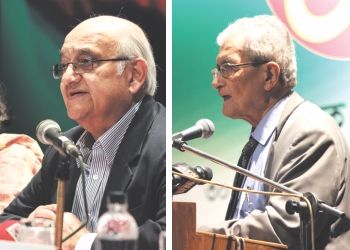| Home - Back Issues - The Team - Contact Us |
 |
| Volume 11 |Issue 01| January 06, 2012 | |
|
|
Perspective The Meaning of Secularism Soraya Auer
The role of religion in politics has always been a hot topic for contention. Religion is credited for the making and breaking of nations new and old. History has shown that where churches and monarchs have fallen, secularism has risen. While the United Kingdom is not a secular state, Prime Minister David Cameron sparked national debate last month when he said, “We are a Christian country. And we should not be afraid to say so.” He was trying to address the country's “moral collapse” and “passive tolerance” of immoral behaviour, which he believed fuelled the UK's August riots, excess in the banking industry, MPs' expenses scandal and home-grown Islamist terrorism. Cameron, who admits to being only a “vaguely practising” Christian, said, “Just as our language and culture is steeped in the Bible, so too is our politics.” In his speech, Cameron acknowledged and respected those of no or other religions. He said, “Many people tell me that it is easier to be Jewish or Muslim here in Britain than it is in a secular country like France. Why? Because the tolerance that Christianity demands of our society provides greater space for other religious faiths too.” The UK is known for its struggle for political correctness on such matters as Christmas, disability and sexual orientation. It is, however, also known for its strong multicultural society. I would go as far to say the “greater space” Cameron describes is a product of much more than just Christian values of tolerance. The periods of enlightenment, revolution, industrialisation and capitalism over centuries has helped bring democracy, secularism and multiculturalism to modern Europe.
By calling on British society to specifically re-embrace Christian values and morals, Cameron risks reversing the same commendable multiculturalism that makes British society what it is today. As a politician and prime minister, Cameron's purpose is to represent the British people and all their varying faiths. By highlighting one religion's values and morals, Cameron, who is no expert in any religion, risks placing the choice of religious principles onto an already heavily-laden political agenda. Across the English Channel, French President Nicolas Sarkozy is more likely to host a Bhangra party than to ever suggest his country should re-embrace any religion's values or morals. The 1789 French Revolution ended the country's relationship with its state religion at the time, Roman Catholicism, and enshrined the concept of laïcité, the strict separation of the Church and State. Freedom of religion is a constitutional right but the French state considers religion a private affair and believes public life should be kept completely secular. This strict adherence to secularism triggered much debate in 2004 when a controversial law banned 'conspicuous' religious symbols in state schools. While the law does not refer to any particular items of clothing or symbols and is applied to all faiths, it was widely believed to be a ban on hijabs and veils. Whether or not Muslims feel targeted because their religious traditions are perhaps more inherently conspicuous than in others, France may always be at loggerheads with its constitutional principles and the beliefs of its large Muslim population. “The meaning of secularism in South Asia is very different from the West's understanding,” said Indian economist Amartya Sen at an event to commemorate Bangladesh at 40 last week. “In the West, it is understood as a person who is not religious or without religion. So if a state is secular it means it has nothing to do with religion. But in South Asia, if you say a state is secular, it means the state treats all religions equally.” He spoke of how, earlier in that day, he had attended an event at the Bangla Academy to receive an award. There they opened the ceremony by reading a verse from the Quran, a verse from the Bible, and finally a verse from the Bhagavad Gita. “They treated all three religions equally,” the Nobel Laureate explained. “If there was a westerner at this event, they would not have described this as a secular event.” Using the example of Akbar the Great, Amartya Sen relayed how the Mughal Emperor's own religious views did not interfere with showing respect for or awarding rights to followers of other religions. Though the tradition of Muslim kings marrying Hindu princesses was not uncommon before Akbar's time, the fact he treated the families of his wives, be they Muslim or Hindu, with equal respect and favour was unique. His administration included numerous Hindu landlords, courtiers and military generals and he granted lands and money for Hindu temples and Christian churches across India. “Mahatma Gandhi,” Sen also added, “was deeply religious at a personal level but was deeply secular in terms of the state. So South Asia's secularism is synthesis, not just distance.” Neighbouring India, a constitutionally secular state, arguably tries to follow Amartya Sen's definition of secularism, one that is equidistant from all religions. For years, it is has faced national and international debate as to how it treats its religious factions, discriminating against one to appease the other. The history of secularism in Bangladesh has not been any less controversial and the issue still remains sensitive. A recently enacted amendment to the constitution restored secularism as a founding principle of the state after it had been taken out by a former government. Despite being a constitutionally secular state, the UN still classes Bangladesh as a “moderate Muslim democracy”. “We cannot expect to construct a secular society out of a few amendments to the constitution,” said Rehman Sohban, a prominent Bangladeshi economist and head of the Centre for Policy Dialogue. “The substance of a secular society demands that we not only tolerate the practice of all faiths but do not discriminate against minorities in the distribution of political and economic opportunities. Also speaking at the 'Bangladesh at 40' event, Sobhan said, “If Bangladesh is to avoid Pakistan's exposure to ideologically inspired terror, the mainstream political parties will collectively need to decide that religion should not be exploited for partisan gain. Whilst all people should be free to pursue their religious beliefs, religion cannot be manipulated to divide the country into political categories of believers and unbelievers.” He explained, “Once we introduce such variables into political life then those who are obsessed with the conviction that they are the truest believers will feel encouraged to assert their right to annihilate not just minorities but, as we are witnessing in Pakistan today, even those of common faith who they feel do not share their interpretation of the religion.” Pakistan's experience, Rehman Sobhan suggested, should teach Bangladesh that once religion is used in political discourse to capture the minds of the people, sooner or later, ideologically motivated fundamentalists would use the same methods for imposing their power and beliefs. “The recent emergence of terrorism in Bangladesh has demonstrated that violence in the name of religion has the potential to escalate into a threat to the functioning of a democratic society,” warned Sobhan. “No matter the system, the system should benefit the people,” summarised Amartya Sen. To achieve this, tolerance seems to be the fundamental principle societies, of ever-changing landscapes, are calling on their countries to adopt. Just being constitutionally secular is not always sufficient. America is constitutionally secular and yet its politics has recently been heavily influenced by Christian values. So is it cause for serious concern that the UK is a Christian country if its society is recognised for its tolerance? Rather than worry about how they consolidate their religious or secular identity on their paper constitutions, governments, including in Bangladesh, should consider more seriously what they say or do to encourage tolerance in society.
Copyright
(R) thedailystar.net 2011 |
||||||||

